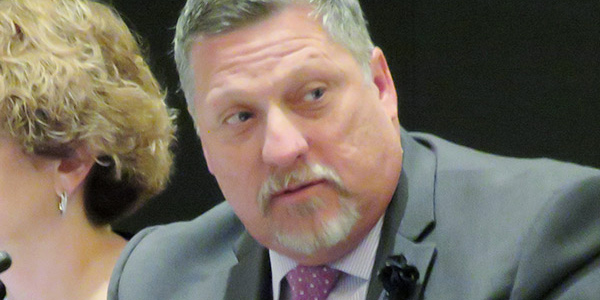NERC’s Reliability and Security Technical Committee (RSTC) is planning a follow-up meeting for an undetermined date to finish the remaining agenda items from its regularly scheduled conference call on Tuesday.
The committee managed to complete only about half of the regular agenda because of an extended debate over its plan for taking over the work of the Planning, Operating and Critical Infrastructure Protection committees, which disbanded in March. (See NERC RSTC Briefs: June 10, 2020.)
The RSTC Subgroup Organization and Notional Work Flow Process proposals met with little concern from committee members when presented for approval. However, contention arose when Marc Child, information security program manager for Great River Energy, presented the scope document for the Security Integration and Technology Enablement Subcommittee (SITES). As presented in the scope document, the goal of SITES is to recommend “practices for incorporating cyber and physical security aspects” into utilities’ business activities.
Though Childs emphasized that the document is still a work in progress and not expected to be finalized until the RSTC’s next scheduled meeting in December, several members expressed surprise at the direction. Carl Turner, engineering services director at Florida Municipal Power Agency, called the document a “pretty dramatic shift” from the purpose of SITES expressed in previous meetings, which he had understood to be about “[ushering] in transformative technologies that change the way we do business.”
“This (presentation) really is … very heavily focused on cybersecurity and security, and those types of applications,” Turner said. “And we may need that, but I think we all definitely need to absorb this. … What happened to some of that ‘reforming the grid’ and thinking about future technologies? I don’t see a lot of bullet points on it — it seems like kind of an afterthought right now, and I thought … last meeting, that was a major forefront of this.”
Brian Evans-Mongeon of Utility Services Inc. backed Turner’s concerns, saying he had “difficulty signing off” on the document and that the committee needed “time to digest” the transition plan. In light of the dispute, Duke Energy’s Greg Stone moved that the committee approve the first two proposals but table the SITES document for further discussion. This was approved, with some participants reminding the committee that some issues will inevitably be discovered once operations begin.
“Until we start intaking work and start working through that, we can’t really lay out all of the specifics at this point in time,” said Christine Hasha of ERCOT. “And so we need to have, basically, a pilot or proof of concept that we can start working through to get some momentum … and start to really refine the structure.”
SARs, Guidelines to be Covered Later
In addition to the SITES document, a number of other scheduled items were not covered in the meeting. These included several approvals and endorsements that were part of the consent agenda but pulled out for further discussion as a result of a motion by Evans-Mongeon:
- Standard authorization request (SAR) for MOD-025-2 — Unit verification and modeling
- SAR for revisions to PRC-023-4 — Transmission relay loadability
- Reliability guideline: Gas and electrical operational coordination considerations — posting for 45-day comment period
- Reliability guideline: Distributed energy resource verification — posting for 45-day comment period
- White paper on assessment of DER impacts on NERC reliability standard TPL-001
Discussion of these items would have followed the approval of the transition plan documents, but because the meeting ran out of time, this was postponed to a later date. Also delayed were a number of reports from committee staff, including an update on the Geomagnetic Disturbance Task Force’s data collection program and a NERC white paper on ensuring resource adequacy, along with reports from the North American Generator Forum and the North American Transmission Forum.
RSTC members discussed adding these items to the agenda for their next meeting, scheduled to be held via teleconference Dec. 15-16, but agreed that this would be too long of a delay because some material might be time-sensitive; in addition, attendees feared overburdening the schedule and causing further delays. Committee staff agreed to poll members in coming weeks to determine an appropriate time for the follow-up meeting.
Guidelines, Subcommittee Leaders Approved

The committee did take action on several items, including the approval of a reliability guideline on DER data collection for modeling in transmission planning studies and endorsing the compliance implementation guidance on reliability standard PRC-019-2 for submittal to the ERO. Chair Greg Ford also solicited volunteers to review a white paper on “possible misunderstandings of the term ‘load loss’”; the final team included Turner and:
- Chris Shepherd, Gannett Fleming;
- Edison Elizeh, Bonneville Power Administration;
- Todd Lucas, Southern Co.; and
- Wesley Yeomans, NYISO.
In addition, Ford named Northwest Power Pool’s Greg Park as chair of the Resource Subcommittee, with Southern’s Rodney O’Bryant as vice chair. Ford also appointed Duke’s Brantley Tillis to chair the Performance Analysis Subcommittee, with David Penney of Texas Reliability Entity serving as vice chair.





